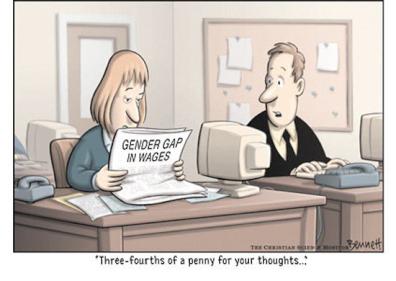Well, guess what? We’re at the Tipping Point for women in business today. Since graduating from Berkeley at the height of the women’s movement protests, I’ve been monitoring our slow, slow, progress. Always looking forward to the day when women are treated as well as men. Of course, there’s always something that ‘s not quite equal—and we can focus on this—and see ourselves as victims . . . still.
There’s a wonderful word “epiphany” that I recently went through when I realized we’ve passed the half-empty marker, men—young men— are no longer the enemy—they’re eager to be our allies. We women are smart and we’re used to working hard, we can multitask easily, we can use our feminine secret tool, intuition, to our advantage. Talent-wise, we’re as good as men in business. But, there’s one thing we haven’t yet grasped—and it’s a doozey: We are our own worst enemy!
I’m not happy with this either, don’t get defensive, stay with me here. First, let me tell you how women are not helping other women. And then, let me tell you how you can make a small change each week to help yourself and to help other women. Malcolm Gladwell, in his book The Tipping Point, did a good job of shining a spotlight on how ideas can be grasped by groups of people where each person links to several others and, suddenly, so much faster than you’d ever imagine possible, you’ve reached the Tipping Point—and a massive social change has taken place.
Well, we’ve reached the Tipping Point for Women! We’re teetering there and now I’ll tell you how you, yes YOU, can do just 2 little things and we’ll be looking at a full glass sooner than you thought possible!
Obstacle Avoidance
Here are the 2 things. Most businesses were set up by men—thank-you guys. All of us are used to seeing the winning team—the men—perform in a particular way—and it’s not the way we women would have designed it. This alone sets up conditions for obstacles—everyday obstacles—that trip up only the second team—the women’s team.
I maintain that we women are smart. We can learn to handle, and even avoid, these obstacles. In fact, after 20 to 30 years of working, you’d discover a number of these on your own. But patience is not a virtue—don’t buy into that platitude—it’s a waste of time for you and for other women. I vow to do my best to help you by alerting you to a business obstacle every week and giving you a strategy to short-circuit it! They’re simple, and because they’ll make sense to you, you’ll remember them. These have been tested by our audience on the WomensMedia website where we get more than 1,000 emails a day detailing what’s worked for these hard-working businesswomen.
Treat Women Equal To Men
So this obstacle avoidance is the first of the 2 things you must do to quickly bring the glass full up. Now, the other thing requires that you listen with an open mind. At first, you won’t like what you hear. I was kicking and screaming when I first read the research results—but it’s true: Today, women are holding women back—it’s no longer the men! If you’re like me and require proof of the research, I refer you to the Max Planck Institute’s expansive study. Fake resumes for jobs were shown to men and women. The names on the resumes were changed back and forth between male and female names. More women than men held the female applicants back while recommending more men for positions, especially positions of authority. This is where I screamed, “Why are we doing this?” Well, here’s what’s going on. Some of us hold the stereotype in our heads that men are managers and women are support staff. It’s hard to avoid stereotypes in the first few seconds, but we can unlearn them—and we will unlearn them! Some of us expect women to work twice as hard as men, because that’s what we had to do—so what, we can get over it! We can get over it because we don’t want this situation to be around for our daughters and our granddaughters!
Tip: So let’s get this Tipping Point ripping along. The Good News is the ball is in our court, and we’re smart. Let’s start avoiding obstacles and begin helping other women. Very soon we’ll be able to tell our daughters that men and women are truly equal in business. Let’s make this happen!
careers, Jobs Indonesia, Indonesia Vacancy











 Jane Hunter, of Hunter’s Wines wanted an effective team but not a top-heavy staff so she relied on the use of consultants in the areas of winemaking, management, accounting, advertising and PR. Jane, whose expertise was as a manager and viticulturist, said “I believe no one person has a monopoly on good ideas, the more people involved managing a business the more innovative you get. All these people work really well together and it gives me confidence to know I can call on them but they’re not actually sitting at the winery.”
Jane Hunter, of Hunter’s Wines wanted an effective team but not a top-heavy staff so she relied on the use of consultants in the areas of winemaking, management, accounting, advertising and PR. Jane, whose expertise was as a manager and viticulturist, said “I believe no one person has a monopoly on good ideas, the more people involved managing a business the more innovative you get. All these people work really well together and it gives me confidence to know I can call on them but they’re not actually sitting at the winery.”








